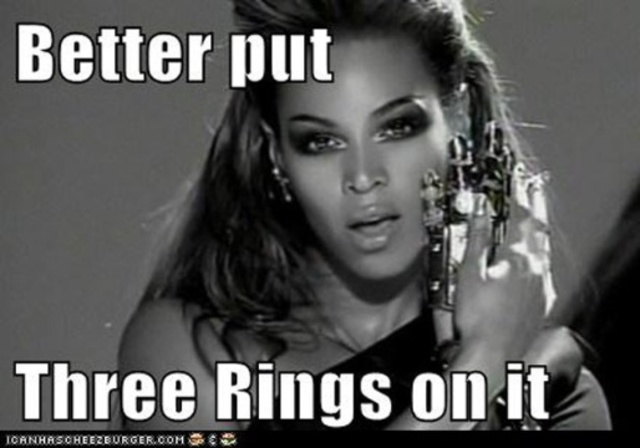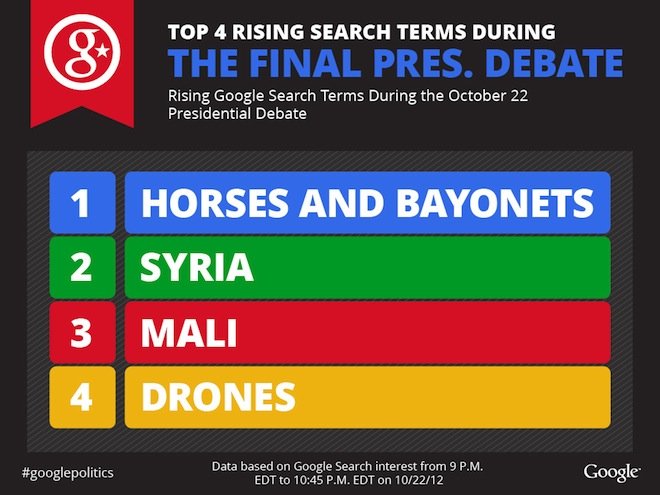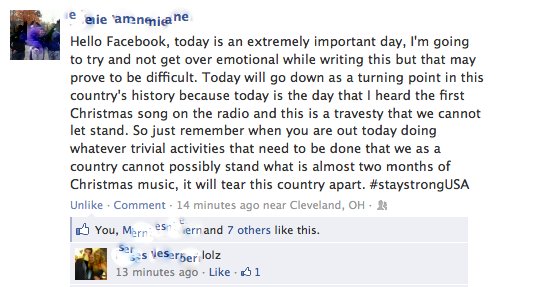Media practice and the 2012 elections: Theorizing new models of democratic participation
This case study is named after a hashtag that was trending on Twitter during the three presidential debates. Appropriated from the popular “Rock the vote” campaign, this label was being used to tag Tweets commenting on the debate as it went down- although not used prominently at any other time during the elections race. These Tweets mocked the debates and election generally, the participants, and specific statements and moments during the debates. Although many of those posting under the #mockthevote hashtag did display some bias towards mocking Mitt Romney, in general this mode of participation was not aligned with a specific political agenda, but rather displayed a more general disregard for the entire spectacle of the debates.
This mocking coverage of the debates on Twitter is just one manifestation of a major trend in media practice and participation during the 2012 elections. This trend in media practice aligns with the rising popularity of mock-news shows like the Colbert Report and the Daily Show, and like these shows, it raises the question of what kind of relationship towards political processes and affairs this kind of media represents and perpetuates: Does this represent a kind of cynical distancing from and condemnation of political processes? Does it express a new kind of engagement and active commentary and participation in these processes? Or perhaps is its own kind of subversive political statement and media activism? In the case of shows like the Colbert Report, likely the answer is all of these, and much of the popularity of these shows relies on the fact that any and all of these positions can be read into it (See: LaMarre, H., Landreville, K., & Beam, M. (2009).) . This multi-valence characterizes the media practices of “mocking the vote”, but within specific communities, practices and phenomena, we can begin to read specific political positions.
Big Bird, Binders full of Women, Horses and Bayonets: Memes as media practice
These three phrases all come from statements made during the Presidential debates, and spawned huge audience response and participation. The most likely reason for this is that each of these phrases were easy fodder for “mocking the vote”. Although roughly linked to actual policies (incidentally, in each of these cases by Mitt Romney), these phrases and the humorous images they invoke remained only loosely associated with these policies as they became the punchline of jokes made online, by the watercooler, and laughed at on late night television shows.
The real power of these phrases seems to come not from their humorousness, but largely from their easy conversion to a virally sharable meme-form. Although several other jokes revolved around the debates, (including Jim Lehrer’s lame moderating and Candy Crowly’s substantially more forceful moderation, Paul Ryan’s incessant water drinking and Joe Biden calling Ryan’s statement “a bunch of malarkey”) these three phrases are easily converted into an obvious hashtag- meaning that within minutes of them being said during the debates, these phrases were “trending” on Twitter (namely had become so popular that they penetrated Twitter’s popularity algorithm and were displayed on the top of the site). These phrases also call up distinct images, making them both more memorable and easy to “memeify”.
To give some background, a meme is by definition a simple idea which is shared virally, and is generally subject to modification and manipulation. The most common manifestation of the meme is of an image onto which simple phrases or messages are typed, overlaying the image. The hashtag can also been seen as a manifestation of a meme, where the label indicates the central idea, and individuals add their own commentary to this label, which can then be shared and modified again ad infinitum.
The meme is an extremely simple communicative tool, which relies upon the slight manipulation of standard symbols and messages- a sort of “running joke” that is kept alive and perpetuated through “likes” and “shares”. Although highly accessible as a medium, with an extremely compact joke accompanied by a supporting image, these memes are also extremely shallow in terms of political content. Almost all of them simply depend on juxtapositions of existing cultural references, bizarre photoshopping of the candidates, and/or punny jokes. The only political message is an implicit mocking of the candidate, sometimes accompanied by a comedically over-glorified image of the other candidate. Although each phrase is associated with an “issue” of some kind, this is largely irrelevant to the message of the meme.
When considering the practices that surrounds the creation and consumption of these memes, it seems that for this most part politics plays an almost non-existent role. For the meme creators, the main motivation does not seem to be to push a political agenda (since many of these memes are almost entirely abstracted from any kind of issue), but rather seems to be a form of “trolling“. Trolling is essentially a form of online pranking, and the ultimate form of disingenuous engagement. The meme-makers of the 2012 elections do not seem to be trying to advance any kind of political discussion or participation, as much as they are simply capitalizing on the existing spectacle that is the elections. They are tapping into a well-spring of viral interest, and using it to appear timely, funny, to get new followers…as a means to generate online social capital, if you will.
Similarly, the consumers of memes have only the shallowest relationship with them. Dialogue is impossible here, only “liking” and “sharing”. There is a disclosure of political contemplation, and those who share these memes are simply reinforcing existing political alignments.

This hypothesis seems to be supported by the fact that all three of these memes were directly exploited by the Obama campaign. The Obama campaign is notoriously more in touch with the social media world, and furthermore has greater popularity among young voters, who are the typical makers and disseminators of memes. As I discuss in my previous post, the popularity of the Big Bird meme was exploited in a joking attack ad released after the first debate. It adopted the overall tone of #mockthevote, joking about the formulaic nature of campaign ads by utilizing all the conventional ploys such as dramatic-movie-narrator and music and black and white snapshots of the “villains”, and juxtaposing this frame with images of Big Bird, the supposed “enemy”.
There is literally no real political content in this ad beyond the same simplistic message contained in all of the other memes: that Mitt Romney is a joke. Like the meme-makers and consumers, the Obama campaign sees that there is more to be gained from recirculating a popular joke than trying to actually engage with “the issues”.
Similarly, after Romney’s “binders full of women” gaffe, the Obama campaign paid Twitter to promote (ie, return as the first search result) a Tweet they had written using the phrase:
Although this Tweet is grounded in a political framing (perhaps necessary since this was simply an awkward turn of phrase Romney used in the midst of explaining how he did deliberately hire women for his cabinet while governor of Massachusetts), it is still essentially exploiting an existing joke to make Romney look foolish. The last phrase, “Horses and bayonets”, was actually a “zinger” of Obama’s directed at Romney and almost undoubtedly intentionally written as a perfect punchline for another round of Romney-mocking memes.

Although the Obama campaign’s appropriation of the meme as political tool suggests that it perhaps has some political value, it is clear that this value is limited to letting those who are already “in on the joke”- ie, those who think that Romney is a fool- have another good laugh at his expense. As one Youtube commenter put it in response to the Obama Big Bird ad:
It seems that in this case, the political meme is largely a practice which distracts and detracts from meaningful policy issues, reinforces an attitude of “The other side is dumb”, and shows little to no sign of cultivating meaningful democratic participation. These phrases are essentially treated like any other pop culture referent which makes its way into a meme, rather than as anything explicitly or meaningfully political.
Performing “Binders full of Women”?
Of these three memes, it seems notable that one of them in particular generated more than just the traditional memes. Romney’s “Binders full of women” gaffe was picked up and used in multiple ways, including as Halloween costumes and as the basis for mocking reviews of binder products written on Amazon. It is hard to say what spurred this more creative reinterpretation and enaction of this particular meme- it may be that this was an easier costume to make than big bird, or that there are no horses and bayonets to review on Amazon. But I also want to suggest that there seems to be some form of deeper connection to actual political practices here.
Women’s issues were fairly central to this political campaign, with the GOP’s positions on Planned Parenthood, abortion, and birth control being particularly contentious. Whereas government funding for PBS or the strength of our armed forces are somewhat more abstract issues, the “binder” comment for many women seemed to reflect suspicions about the GOP’s tendency to objectify women. It touched upon issues of identity and embodiment, and called for people to respond and elaborate these issues through the joke of the binder. By dressing oneself as a binder, this seems to enact and suggest the way that the female body is perceived as being controlled by conservative policies. And these Amazon reviews provide an opportunity to elaborate on the ideas about women that would cause them to need to be controlled, organized, protected:
Although still performed in a mocking, ironic tone, this one-liner inspired a kind of engagement beyond the simplistic memes of Big Bird or Horses and Bayonets. This issue is deeply connected to identity politics, which motivates more complex forms of political practice than a single issue might.
These were not the only “serious” instances of people mocking the vote. In many cases, people did seem to be utilizing the real power of irony and satire to make a political statement about the elections:
And my personal favorite, posted on the day of the elections:
It is a bit hard to understand this one unless you spent time on social media on Election Day. The dramatic public post expressing concern about the fate of the country, and about the importance of the day was a staple not only on social media, but on many mainstream news channels as well. But here, this statement is recontextualized into the “next big thing”, the upcoming Christmas season- perfect in the way that it suggests the parallels between the trite, ritualized emotions and blatant consumerism of the Christmas and elections season.
Overall most of the jokes made and memes circulated during the elections did not seem to even be part of a practice of “mocking the vote”, which implies a positioning outside of the “system”, outside of the cheap politics of him-versus-us. Rather, they reinforced this system, possibly even debasing the system further by framing it not as a political difference, but simply making the other “side” seem like a big joke, not worthy of serious consideration.
Some “mock the vote” practices, such as the “binders full of women” phenomenon, did seem to be making a more serious political point. But this genre simply did not seem to gain the traction that the “Cheap laugh” genre did. Perhaps this can be understood as a result of the fact that politically empty or partisan jokes are more widely accessible, and can easily be shared and made viral via social media. Again, this perhaps shows the brilliance of the satire featured on the Colbert Report, which seems to be intentionally readable as of any political orientation. This allows nearly all of the viewers to be “in on the joke”, be they Democrat, Republican, or of the camp genuinely mocking the vote and the political system all together. Perhaps this is why such biting satire can be “mainstream” media, whereas purely “mock the vote” practices barely make it in the new media attention economy.










Way cool! Some very valid points! I appreciate
you writing this post and the rest of the website is extremely good.